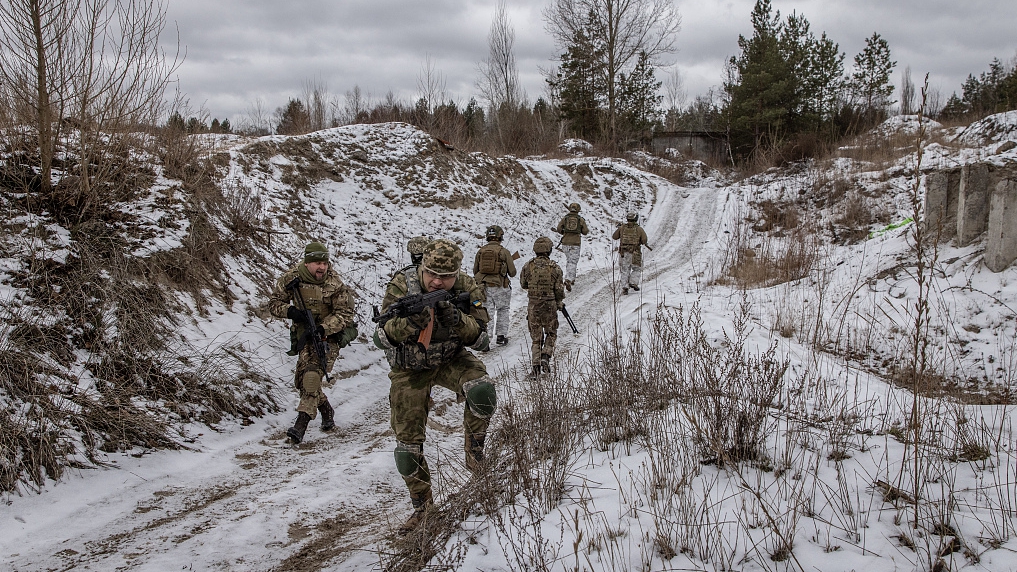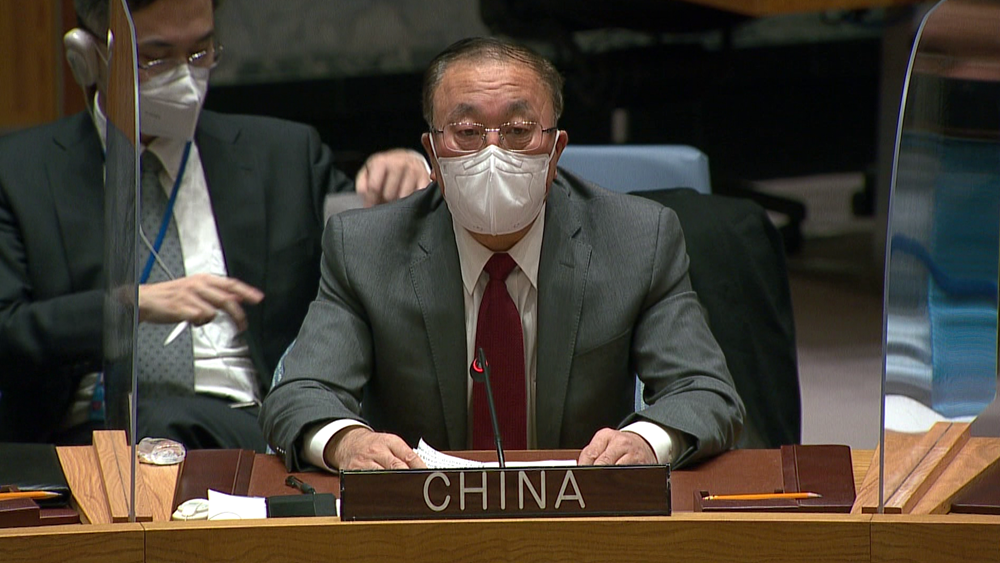
Civilians participate in a Kiev Territorial Defense unit training session in Kiev, Ukraine, January 29, 2022. /CFP
Civilians participate in a Kiev Territorial Defense unit training session in Kiev, Ukraine, January 29, 2022. /CFP
China's UN ambassador on Monday called for quiet diplomacy instead of megaphone diplomacy on the tensions between Russia and Ukraine.
In a procedural vote, China and Russia voted against a Security Council meeting on Ukraine. The meeting went ahead as 10 other council members voted in favor.
China opposes the Security Council's holding the meeting at the United States' request. In a letter to the president of the Security Council dated January 27, the United States claimed that Russia's deployment of troops on the border with Ukraine posed a threat to international peace and security. China cannot agree with such a claim, said Zhang Jun, China's permanent representative to the United Nations.
"Recently, there have indeed been tensions over the issue of Ukraine. We are paying attention to what exactly is causing the tensions. Some countries led by the United States have claimed that there is a looming war in Ukraine. Russia has repeatedly stated that it has no plans to launch any military action. And Ukraine has made it clear that it does not need a war. Under such circumstances, what is the basis for the countries concerned to insist that there would be a war?" he asked.
The United States, Ukraine, relevant European countries and NATO have varying forms of diplomatic contacts with Russia. The parties concerned should persist in seeking to resolve their differences through dialogue and negotiations. What is urgently needed now is quiet diplomacy, not megaphone diplomacy, he said.
This is the view held by many members of the Security Council, which have also made numerous efforts toward this end. Regrettably, the United States did not accept such a constructive proposal. At a time when dialogue and negotiations are underway and concrete progress has yet to be made, the holding of such an open meeting by the Security Council is clearly not conducive to creating a favorable environment for dialogue and negotiations, nor is it conducive to defusing the tensions, said Zhang.
"China once again calls on all parties concerned to remain calm, not to do anything to aggravate tensions or hype up the crisis and to properly resolve their differences through consultations on an equal footing on the basis of mutual respect and fully taking into account each other's legitimate security concerns," he said.
China's position on Ukraine is consistent. To resolve this issue, there is a need to return to the original point of implementing the new Minsk Agreement. This agreement, endorsed by the Security Council in its Resolution 2202, is a binding foundational political document recognized by all parties and should be effectively implemented. China supports all efforts in line with the direction and spirit of this agreement, and hopes that all parties concerned will show their positive willingness to implement the agreement, resolve their differences arising from the implementation of the agreement through consultations, and earnestly promote its implementation, he said.
The expansion of NATO is a problem difficult to circumvent in handling the current tension. NATO is the product of the Cold War, and NATO expansion epitomizes bloc politics, said Zhang.
"We believe that the security of one country should not be achieved at the expense of the security of other countries. Still less should regional security rely on strengthening or even expanding military blocs. Today in the 21st century, all parties should completely abandon the Cold War mentality and come up with a balanced, effective and sustainable European security mechanism through negotiations, with Russia's legitimate security concerns being taken seriously and addressed," he said.
02:19

Who said what
Russia's UN ambassador Vassily Nebenzia said Monday that his country has no plans to invade Ukraine.
"Our Western colleagues are talking about the need for de-escalation. However, first and foremost, they themselves are whipping up tensions and rhetoric and provoking escalation," he said.
"This is despite the fact that we are constantly rejecting these allegations, and this is despite the fact that no threat of a planned invasion into Ukraine from the lips of any Russian politician or public figure over all of this period – no such threat has been made. Rather, at all levels, we've been categorically rejecting such plans."
On Monday, U.S. President Joe Biden warned of "swift and severe consequences" from the United States and its allies if Moscow attacked Ukraine.
British Foreign Secretary Liz Truss on Monday said the government will be ready to impose "wide-ranging" sanctions against Russia to stop its aggression towards Ukraine by February 10.
Ukrainian Defense Minister Olexiy Reznikov said that he sees no need to convert the Ukrainian economy from civilian to military-based, local online media outlet LB.ua reported Monday.
His remarks came after Ukrainian President Volodymyr Zelensky on Friday called on the Western governments and media to stop fueling panic over the Russian troop buildup and said the panic had negatively impacted the Ukrainian economy, adding that the biggest threat it now faced was internal destabilization.
Since November, Kiev and some Western countries have accused Russia of assembling heavy troops near the Ukrainian border with a possible intention of "invasion."
Russia denied the accusation, saying that Russia has the right to mobilize troops within its borders to defend its territory as NATO's activities constitute a threat to Russia's border security.
(With input from Xinhua)

